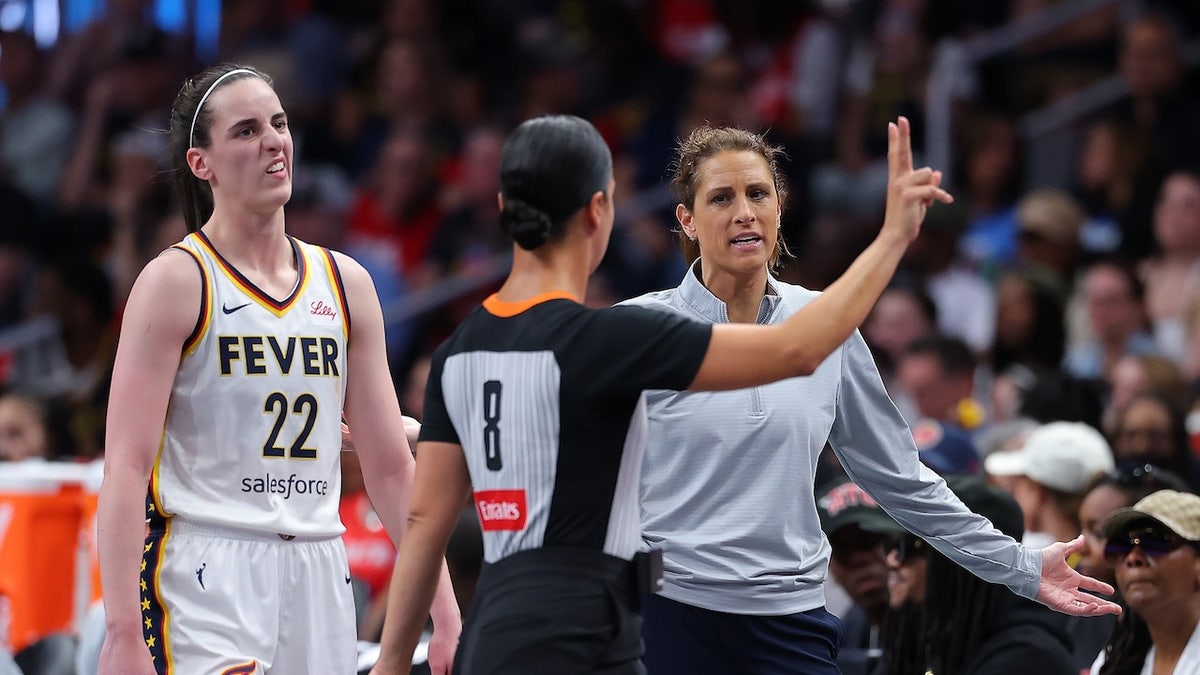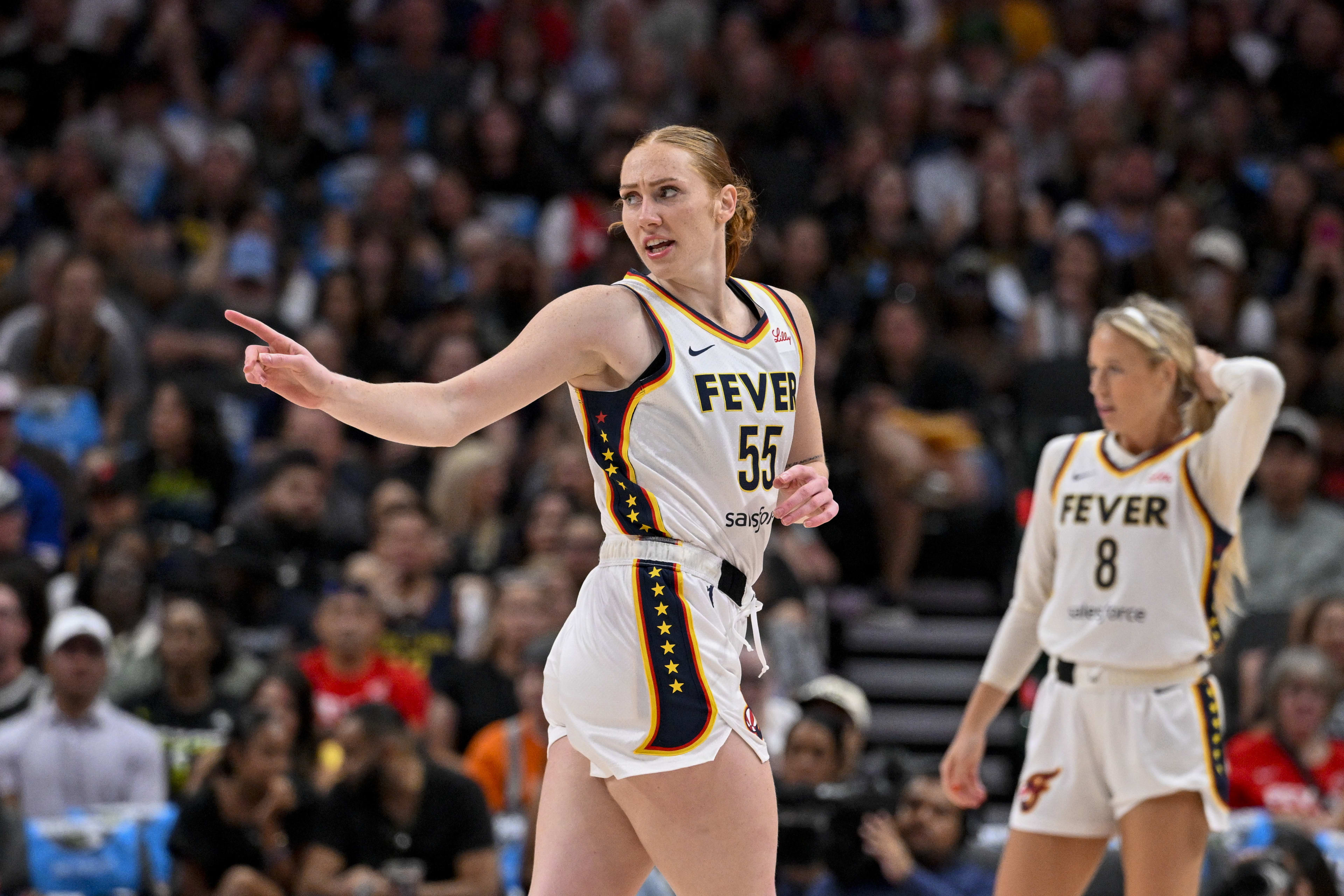The locker room after the game was a mixture of triumph and simmering tension. While the Indiana Fever had secured a hard-fought victory, propelling them further into playoff contention, an undercurrent of unease rippled through the celebratory atmosphere.

The air, thick with the scent of liniment and sweat, suddenly felt charged with unspoken words, particularly around the team’s prized rookie, Caitlin Clark. Her usual post-game elation seemed tempered, her gaze distant, a tell-tale sign that something deeply unsettling had transpired, overshadowing the team’s collective success.
The source of Clark’s palpable discomfort, and what would soon become a major talking point across the league, stemmed from comments made by her head coach, Stephanie White, during the post-game press conference.
The questions had naturally gravitated towards the team’s performance, but one reporter, perhaps fishing for a narrative, had specifically asked about the decision to bench Chloe Bibby for the entire second half, a move that had raised some eyebrows during the game. Bibby, a consistent contributor, had unexpectedly ridden the pine, and the rationale for her absence was unclear to many.
Stephanie White, known for her candidness but usually measured tone, had responded with an uncharacteristic sharpness. Her words, delivered with a frustrated edge, went beyond a simple coaching decision, veering into what many perceived as a direct and public criticism of Bibby’s readiness or effort.
While the exact quote would soon be dissected endlessly, the general sentiment conveyed a lack of satisfaction with Bibby’s play, suggesting she wasn’t meeting expectations in a way that felt less like constructive feedback and more like a public admonishment. The comments were stark, perhaps even designed to send a message, but their impact on the team, particularly its younger players, was immediate and unsettling.
Caitlin Clark, seated front and center as the face of the franchise, had listened to White’s remarks with increasing disbelief. Her expressions, usually so animated and open, tightened noticeably. Clark, still navigating the intense scrutiny of her rookie season, prides herself on team cohesion and positive reinforcement.
She understands the power of words, both on and off the court, and the potential for public criticism, especially from a head coach, to demoralize a player. To hear such pointed remarks directed at a teammate, publicly and seemingly without softening, clearly caught her off guard and left her visibly shaken.

The WNBA is a tight-knit league, and the bond between teammates is often forged in the fires of intense competition and shared sacrifice. Clark, having recently come from a collegiate environment where team camaraderie was paramount, likely felt a strong sense of empathy for Bibby. She knew the immense pressure that comes with playing at this level, and the psychological toll that public criticism can take.
To witness a teammate, who contributes diligently, be subjected to such sharp words from the person meant to protect and guide the team, was undoubtedly jarring for the young star. It challenged her perception of how a team dynamic should function and how leadership should be exercised.
The “nasty comments” from Coach White weren’t just about the benching; they were about the tone and delivery. They lacked the usual coach-speak of “we need to improve collectively” or “we’re looking for different matchups.” Instead, they seemed to lay blame, to isolate a player in a public forum.
In a league where player empowerment and mental well-being are increasingly prioritized, such remarks can quickly become problematic, eroding trust and fostering an environment of fear rather than growth. Clark, with her innate leadership qualities, would have instinctively understood the potential ripple effects of such a public dressing-down.
Beyond the immediate impact on Bibby and Clark, the incident sparked a wider conversation about coaching philosophies and player management in professional sports. Should coaches air their grievances with players publicly? Or should such conversations be kept behind closed doors, allowing for private feedback and mutual understanding?
While some argue that public accountability can motivate, others contend that it undermines player confidence and creates unnecessary tension within the locker room. White’s comments, whether intentional or a slip born of frustration, certainly ignited this debate, putting her coaching style under an unwelcome microscope.
The media, ever hungry for narrative, seized upon the story. Social media exploded with reactions, dissecting White’s words, speculating on Bibby’s future, and, crucially, analyzing Clark’s visible reaction.
“Caitlin Clark in shock” became a trending topic, amplifying the drama and drawing more attention to an internal team matter that had spilled into the public arena. The incident threatened to overshadow the team’s win, turning what should have been a moment of celebration into a discussion about internal discord and coaching methods.

For Chloe Bibby, the comments undoubtedly landed with a heavy heart. To be benched is one thing; to have the reasons for it publicly dissected and criticized by your coach is another entirely.
It’s a professional affront that can shake a player’s confidence and make them question their place on the team. Her teammates, seeing her put in the work daily, would likely feel a collective empathy, potentially creating a subtle wedge between the players and the coaching staff, even if unintended by White.
As the dust settles, Stephanie White will undoubtedly face questions from within the organization, and potentially from the players themselves, about the appropriateness of her remarks. Rebuilding trust and ensuring team unity will be paramount, especially with a talent like Caitlin Clark at the center of the team’s future.
The incident serves as a stark reminder that in professional sports, words carry immense weight, and a coach’s responsibility extends beyond Xs and Os to fostering a supportive and psychologically safe environment for their athletes.
Indiana Fever coach Stephanie White issues apology over her major Caitlin Clark decision | The US Sun
For Caitlin Clark, this was a raw, immediate lesson in the complexities of professional sports, a glimpse behind the curtain where not everything is as polished as it seems.